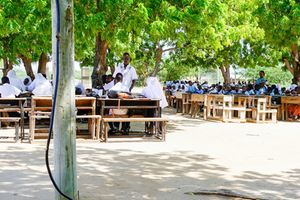Partnerships essential for prosperity

President of Kenya Uhuru Kenyatta speaks during the Sustainable Blue Economy Conference at the KICC in Nairobi on November 26, 2018. PHOTO | SALATON NJAU | NATION MEDIA GROUP
What you need to know:
- Today, they are a multi-trillion-dollar global economy supporting hundreds of millions of people and driving economic growth.
- Our waters also drive a marine economy, which supports 350,000 jobs and contributes 35 billion Canadian dollars to our GDP.
- Meaningful youth employment is critical for the success of our economies.
- The true potential of the ‘blue economy’ has not been fully captured.
Throughout history, oceans, seas, lakes and rivers have provided life and livelihoods to people around the world.
Today, they are a multi-trillion-dollar global economy supporting hundreds of millions of people and driving economic growth.
But the true potential of the ‘blue economy’ has not been fully captured. In Canada, we understand the importance of water.
Not only does Canada have the largest coastline in the world, we border three oceans and hold 20 percent of the world’s freshwater resources.
Our waters also drive a marine economy, which supports 350,000 jobs and contributes 35 billion Canadian dollars to our GDP.
CREATING JOBS
With proper stewardship, those waters have also come to play a key role in not just creating good jobs and expanding industry, but in promoting and supporting inclusivity. Indigenous communities have a special relationship with our waters, and their stewardship, cultures and knowledge are helping to keep our lake, river and ocean ecosystems healthy. Canada made the blue economy a cornerstone of its G7 presidency this year, shepherding the Charlevoix Blueprint for Healthy Oceans, Seas, and Resilient Coastal Communities and the Oceans Plastics Charter.
We invited countries from outside the G7 – including Kenya – for a dedicated conversation on oceans.
Additionally, last week Canada held its first leader to leader engagement with the Pacific Islands Forum where Prime Minister Justin Trudeau demonstrated Canada’s continued commitment to supporting those countries faced with the existential and immediate threat of climate change.
SUSTAINABLE
-We see the Sustainable Blue Economy Conference in Nairobi as a natural extension of our work, and when approached to co-host the conference with Kenya, we had no hesitation in accepting.
This conference will help us continue the important work of meeting the goals of the 2030 Agenda for Sustainable Development.
Goals 5 and 14, in particular, emphasise the importance of achieving gender equality, and conserving and sustainably utilising oceans, seas and marine resources.
We are thrilled that a conference of this magnitude and importance is taking place in Africa, where the potential for the blue economy is enormous.
CONTINENTAL COASTLINE
Almost three quarters of the African countries have a coastline or are themselves islands, and the total continental coastline is over 47,000km.
When we add the rivers and lakes, we can understand the impact that a prosperous, inclusive and sustainable blue economy can have on communities.
When we say “blue economy” we are not only talking about fish. We are also talking about the shipping industry, tourism and energy.
The International Energy Agency says ocean renewable energy can potentially supply more than four times current global energy demand.
Canada is a leader in harnessing tidal power, and Africa could do the same, complementing other work in renewable energy, such as wind, solar and geo-thermal.
EXCHANGE IDEAS
This is the first conference to bring scientists, innovators, businesses, academics and civil society together with heads of state, ministers and policymakers in one forum on these issues. It is a chance to exchange ideas, experiences and the latest scientific advances to help spread wealth and prosperity.
The conference as an opportunity to promote a stronger role and voice for women in the blue economy. We cannot expect to reap the benefits if half of the population is left behind. Research shows that 85 percent of workers in the ocean economy in the Global South are women, but very few of them are in senior or leadership positions.
Investments in the blue economy should ensure that the benefits are equally distributed, including amongst the most vulnerable and marginalised people.
BLUE ECONOMY
Meaningful youth employment is critical for the success of our economies. The blue economy offers real opportunities to create good jobs, and harness the creativity, energy, and innovation of young minds.
The conference is a chance to lay the foundation for a sustainable, inclusive and prosperous future involving ceans, seas, lakes and rivers. (First published on Inter Press Service on Nov 24).
Ms Stadelbauer is the High Commissioner-designate of Canada to Kenya, Rwanda, Uganda and Permanent Representative to the United Nations, Nairobi. She is a career diplomat with 25 years in foreign service





